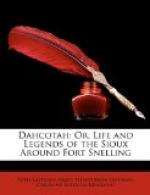CHAPTER II.
A few months ago, the Deer-killer had told Wenona that Wanska was noisy and tiresome, and that her soft dark eyes were far more beautiful than Wanska’s laughing ones. They were not at home then, for Wenona had accompanied her parents on a visit to some relations who lived far above the village of Shah-co-pee.
While there the Deer-killer came in with some warriors who had been on a war party; there Wenona was assured that her rival, the Merry Heart, was forgotten.
And well might the Deer-killer and Wenona have loved each other. “Youth turns to youth as the flower to the sun,” and he was brave and noble in his pride and power; and she, gentle and loving, though an Indian woman; so quiet too, and all unlike Wanska, who was the noisiest little gossip in the village.
Often had they wandered together through the “solemn temples of the earth,” nor did she ever fear, with the warrior child for a protector. She had followed him when he ascended the cliffs where the tracks of the eagle were seen; and with him she felt safe when the wind was tossing their canoe on the Mississippi, when the storm spirits had arisen in their power. They were still children when Wenona would know his step among many others, but they were no longer children when Wenona left Shah-co-pee’s village, for she loved with a woman’s devotion—and more than loved. She had trembled when she saw the Deer-killer watch Wanska as she tripped merrily about the village. Sleeping or waking, his image was ever before her; he was the idol to which her spirit bowed, the sun of her little world.
The dance to the giant was to be celebrated at the village where they were visiting; the father of Wenona and “Old John” the medicine man, were to join in it. The maiden had been nothing loth to undertake the journey, for the Deer-killer had gone on a war party against the Chippeways, and she thought that in the course of their journey they might meet him—and when away from Wanska, he would return to her side. He could not despise the love she had given him. Hope, that bright star of youth, hovered over her, and its light was reflected on her heart.
When they arrived at the village of the chief Markeda, or “Burning Earth,” the haughty brow of the chief was subdued with care. He had dreamed of Haokah the giant, and he knew there was sorrow or danger threatening him. He had sinned against the giant, and what might be the consequence of offending him? Was his powerful arm to be laid low, and the strong pulse to cease its beatings? Did his dream portend the loss of his young wife? She was almost as dear to him as the fleet hunter that bore him to the chase.
It might be that the angry god would send their enemies among them, and his tall sons would gladden his sight no more. Sickness and hunger, phantom-like, haunted his waking and sleeping hours.




